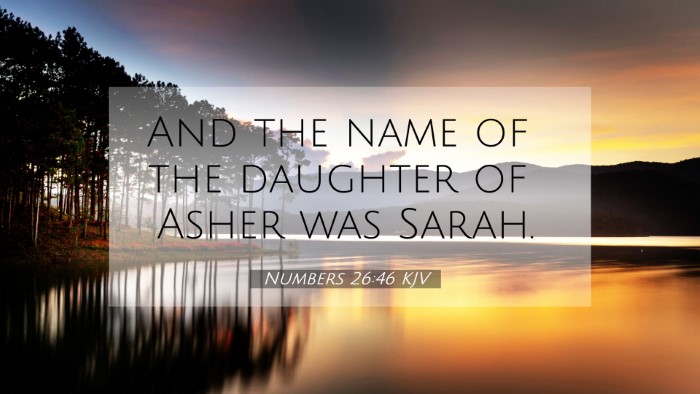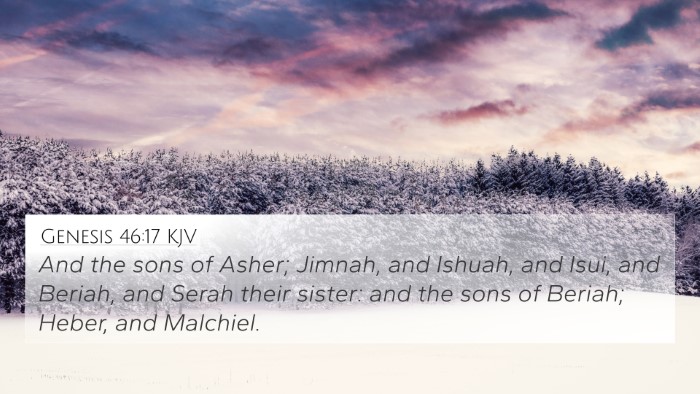Understanding Numbers 26:46
Introduction
Numbers 26:46 states: "And the name of the daughter of Asher was Serah." This simple yet profound verse is rich with cultural and theological implications, offering a glimpse into the importance of lineage and heritage in biblical times. Below is a combined analysis from several public domain commentaries, presenting insights from Matthew Henry, Albert Barnes, and Adam Clarke.
Verse Context and Meaning
The mention of the daughter of Asher, Serah, highlights her significance within the family line of this tribe. In a predominantly patriarchal society, the name and identity of women often remained unrecorded, making this verse remarkable as it explicitly acknowledges a female ancestor.
Insights from Commentaries
- Matthew Henry: Henry emphasizes the rarity of women being named in genealogies and interprets this inclusion as an indication of Serah's importance within her tribe. Her name signifies a potential legacy that may impact future generations.
- Albert Barnes: Barnes notes that Serah's mention could signify her role in the narrative of Israel’s tribes, possibly leading to significant historical or cultural implications. He suggests that the naming may relate to her actions or celebrated traits recognized among her people.
- Adam Clarke: Clarke draws attention to the broader familial connections and the cultural significance of lineage in the tribe of Asher, suggesting that Serah's mention serves as a testament to the preservation of tribe and family identity throughout Israel's history.
Thematic Connections to Other Bible Verses
Understanding Numbers 26:46 invites comparison with various other verses that share similar themes of heritage, importance of lineage, and God's faithfulness across generations. Below are some critical cross-references:
- Genesis 46:17: "And the sons of Asher: Jimnah, and Ishuah, and Isuah, and Beriah, and their sister Serah." - This verse further provides context regarding Serah's family, highlighting her relationships with her brothers.
- 1 Chronicles 7:30-31: "The sons of Asher were Imnah, Ishuah, and Isuah..." - Chronicles offers a broader look at the descendants of Asher, emphasizing the importance of tribal genealogy.
- Exodus 6:23: "And Aaron took him Elisheba, the daughter of Amminadab, sister of Nahshon, to wife; and she bare him Nadab and Abihu..." - This verse highlights the significance of familial lines within the priestly tribe, paralleling the importance shown in Numbers 26.
- Proverbs 4:7: "Wisdom is the principal thing; therefore get wisdom: and with all thy getting get understanding." - This theme resonates, suggesting the lasting impact of past generations and the wisdom gained from understanding one’s lineage.
- Matthew 1:5: "And Salmon begat Boaz of Rahab; and Boaz begat Obed of Ruth; and Obed begat Jesse." - The genealogy of Christ further illustrates how lineage plays a role in divine plans and purposes.
- Ephesians 3:14-15: "For this cause I bow my knees unto the Father of our Lord Jesus Christ, of whom the whole family in heaven and earth is named." - This New Testament reference emphasizes the spiritual heritage shared by all, linking to the theme from Numbers 26:46.
- Luke 3:36: "Which was the son of Cainan, which was the son of Arphaxad, which was the son of Shem, which was the son of Noah, which was the son of Lamech." - The lineage of Jesus reinforces the importance of each individual in the purpose of God’s redemptive plan.
Exploring the Importance of Cross-Referencing
In biblical study, identifying connections between verses is vital for a deeper understanding of scripture. Here’s how you can utilize cross-referencing tools effectively:
- Tools for Bible Cross-Referencing: Utilize a Bible concordance to find related passages.
- Bible Cross-Reference Guide: Use guides that outline thematic connections and parallel accounts.
- Inter-Biblical Dialogue: Explore how different books of the Bible interact with one another, leading to a richer interpretation.
- Comparative Bible Verse Analysis: Compare similar passages to grasp theological implications more thoroughly.
Conclusion
Numbers 26:46 serves as a significant reminder of the biblical heritage and the value of every person in God's plan. By understanding its context and cross-referencing with other scriptures, readers can gain a deeper appreciation for the connections that exist throughout the Bible.
This analysis is designed for those interested in:
- Understanding Bible verse meanings
- Finding cross-references for deeper study
- Identifying connections between Old and New Testament themes
- Exploring links between the genealogies and the overarching narrative of Scripture



